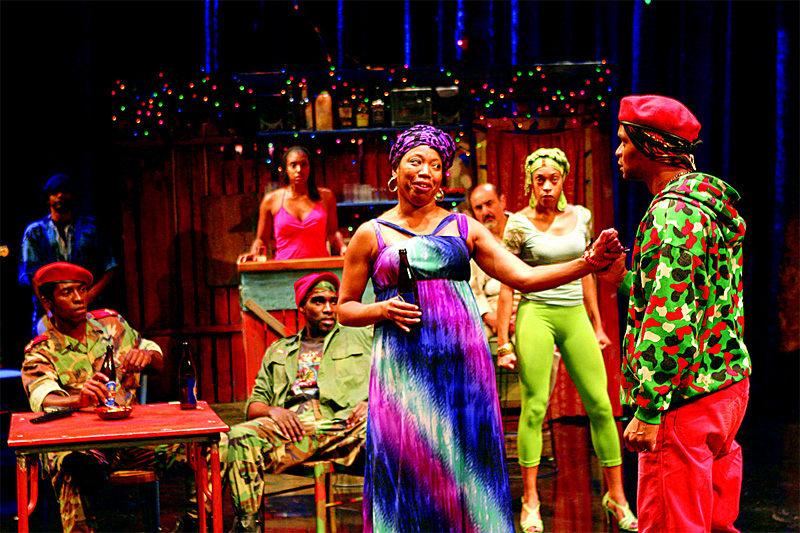Congo is the last place you’d want to go for a field trip. Plagued by epidemic rape and violence since civil war broke out in 1996, more than five million lives have been lost there, according to some estimates. Hundreds of thousands have fled to Uganda, where Lynn Nottage did her research among refugees before writing Ruined. With her on that 2004 trip was Kate Whoriskey, now Intiman’s artistic director, who mounted the play four years later at Chicago’s Goodman Theatre. Their interviews paid off: Ruined won Obies and a Pulitzer.
So, as it frankly addresses rape, complex tribal factionalism, international meddling, and refugees, is Ruined an entirely depressing night of theater? No. Mama Nadi’s bar/brothel in the Ituri rain forest is a deeply involving, gratifying, and—dare I say it about a war zone?—enjoyable place to visit. There’s even music and dancing.
Proprietor Mama Nadi (the one-named actress Portia) values profit over partisanship. She cheerfully serves anyone who pays, whether fighting for the rebels or the government. But she needs fresh product, supplied in the opening scene by Christian (Russell G. Jones): two destitute young women for the price of one. Salima (Quincy Tyler Bernstine), the plainer of the two, is employable for the “intimate” side of the operation. Prettier Sophie (the exquisite Condola Rashad) has already been “ruined” for customer purposes by a violent rape. Despite her pain, evident beneath her stoic attempts to conceal it, spirited Sophie can work as a barmaid and singer.
We also meet their experienced colleague Josephine (the breathtakingly leggy and acrobatic Cherise Boothe), who claims to be the daughter of a village chief. She also hopes to escape the whorehouse as the mistress of foreign mining opportunist Mr. Harari (Tom Mardirosian), a regular client. Also visiting are leaders of the rebels and the Congolese government, forcing the wily grande dame Mama Nadi into double-dealing that seems destined to backfire. To say much more about the plot would risk diminishing its subtle revelations.
If Mama Nadi seems a slightly familiar figure, profiteering to survive the horrors of war, that’s because she is. Nottage began Ruined as a reworking of Brecht’s Mother Courage, and some vestiges remain. But Nottage is a skilled author in her own right, with a gift for character-rich dialogue. She gracefully embeds complicated exposition in her writing. It helps, too, that along with Whoriskey, most of the cast and crew was involved in the original Chicago production. This virtuoso team gives Ruined the natural fluidity of an organism doing what it was born to do.
Amid the throng of strong performances, Portia powerfully anchors the tale and supplies much of its humor. Mama Nadi’s reluctant, ecstatic, ankle-flexing orgasm—endowed by a caramel imported from Belgium—is superbly over the top, but also defiantly exhibits a type of sensual pleasure denied women in a war zone. Her Beatrice-and-Benedick screwball dynamic with Christian is terrifically satisfying, too. She attacks him for his ridiculous dancing and exuberant Fanta quaffing, and for desiring a love that “can’t be put on a scale.” He’s her constant verbal punching bag, and, though she won’t admit it, likely her only real friend.
As the reluctant prostitute Salima, Tyler Bernstine lucidly depicts the survivor’s impulse. Her body is a literal battlefield in a dehumanizing war. Rashad suggests the languid glamour of Sade while singing the show’s beautiful original music (lyrics by Nottage, music by Dominic Kanza).
Around them, Mama Nadi’s place beckons as an exotic, even (deceptively) peaceful, destination and refuge. The violence and suffering of Ruined are more implicit than overt: a limp, a wince, a recounted memory. Rimming Derek McLane’s lush, circular primary set is a background forest of tree trunks; they cradle the action in a seemingly protective embrace. Then, animated with Rob Milburn and Michael Bodeen’s jungle sounds, the forest suddenly flares with metallic light and fills with militants.
Because Nottage and Whoriskey wisely choose not to overload the suffering in Ruined, they actually allow us to feel more.








